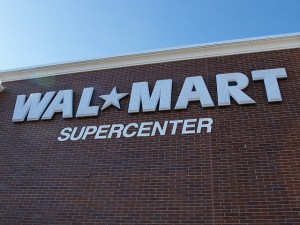A conservative case against small-town Walmarts
This spring, Walmart, the world’s largest retailer, announced plans to build a Supercenter east of the towns of Whitehall and Montague, just north of Muskegon. This would be the third Walmart within approximately 25 miles of Whitehall-Montague.
As Walmart’s plans often do, this one has engendered protests. The White Lake Chamber of Commerce held an emergency meeting and voted 11-1 to oppose Walmart’s entry into the local market. Community members established a Facebook group for those similarly opposed.
Walmart is often seen as a test of one's political bona fides. Progressives and liberals are supposed to hate it for its anti-union practices and low wages. Conservatives are supposed to love it as a triumph of the free market. While I’m convinced that there is no easy answer to the question of the low-price retail giant, I’d like to look at what I think is the conservative case for keeping Walmart out Whitehall-Montague.
First, any conservative should recognize as legitimate and even laudable the efforts of those in the Whitehall-Montague area to debate, discuss and decide whether they want the store. Conservatives cannot simply pay lip service to decentralization. They should praise localism in action.
Conservatives rightly oppose the over-nationalization of our politics and the centralization of power in Washington. Thus, it is paradoxical that when it comes to business, so many conservatives see no problem with large behemoths. Indeed, I'd argue that the proper conservative approach is what my friend Rod Dreher has articulated: A truly free market should be our organizing principle, but “the economy must be made serve humanity’s best interests, and not the other way round. Big business deserves as much skepticism as big government.”
There is no reason to check conservative distrust of big institutions at the door just because it’s a business. The Whitehall community can and, I think, should rightly honor local ownership over that of a global chain based hundreds of miles away in Arkansas.
Furthermore, experience and studies demonstrate that often when Walmart moves into a community it hollows out a town’s business district, can lead to a net decrease in jobs, and often lowers wages overall for a community. While we can unduly romanticize local stores and businesses, conservatives should see a value in the locally rooted business person. These local stores grow up organically to serve the needs of the community and constitute part of the very fabric of the community. A conservative should be extremely skeptical and distrustful that lower prices are worth the pulverization of local businesses.
Some will say that it is just business, but the whole point for the conservative is that life is about more than the bottom line. A conservative should be concerned about what Walmart might do to the downtowns of Whitehall and Montague, and what this will do to the civic fabric of those communities. Moreover, a concern about the loss of jobs and the depression of wages hardly seems to be a negligible conservative concern.
Moreover, conservatives care about wasteful government spending, government subsidies and the burden these place on taxpayers. Well, there is evidence that Walmart’s low wages cost taxpayers in a variety of ways. Let's take just one. A recent study by House Democrats suggests that Walmart’s low wages are sustainable because many of Walmart’s employees avail themselves of public assistance. What we gain in lower costs may well be lost in tax expenditures in propping up the chain’s business model.
Finally, conservatives privilege and defend what Russell Kirk called the “permanent things” – those that incarnate the true, the good and the beautiful. While conservatives may be accused of snobbery in making this argument, the risk is worth taking. Walmart’s stores are ugly, banal and vulgar. They displace the small and the beautiful. As Professor Stephen Bainbridge has written, “Being a conservative is supposed to be about things like tradition, community, and, yes, aesthetics. If I'm right about that, it's hard to see why a conservative should regard Wal-Mart as a societal force for good.”
He’s right. Whitehall and Montague are now quaint and beautiful. You cannot quantify the value of integrated, organic downtowns that are beautiful and walkable. There is nothing in the conservative playbook that says that economic efficiency needs to trump these things. Nor is beauty merely a privilege of the rich. We all deserve to be surrounded by beauty. Thus, if conservatives are being true to the permanent things, then these things should be privileged over the mere right to buy cheap goods.
See what new members are saying about why they donated to Bridge Michigan:
- “In order for this information to be accurate and unbiased it must be underwritten by its readers, not by special interests.” - Larry S.
- “Not many other media sources report on the topics Bridge does.” - Susan B.
- “Your journalism is outstanding and rare these days.” - Mark S.
If you want to ensure the future of nonpartisan, nonprofit Michigan journalism, please become a member today. You, too, will be asked why you donated and maybe we'll feature your quote next time!


 WHAT PRICE BARGAINS? While Walmart’s low prices may help some shoppers, a store in a small community carries other costs, says Conor Dugan. (Photo by Flickr user Ron Dauphin/used under Creative Commons license)
WHAT PRICE BARGAINS? While Walmart’s low prices may help some shoppers, a store in a small community carries other costs, says Conor Dugan. (Photo by Flickr user Ron Dauphin/used under Creative Commons license)